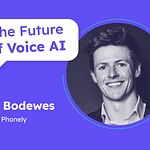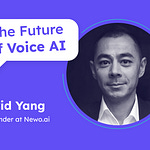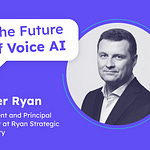In the Future of Voice AI series of interviews, I ask three questions to my guests:
- What problems do you currently see in Enterprise Voice AI?
- How does your company solve these problems?
- What solutions do you envision in the next 5 years?This episode’s guest is James Bednar, VP of Product and Innovation at TTEC.
James Bednar is VP of Product and Innovation at TTEC, where he leads strategy at the intersection of CX operations and emerging tech. With a background in cognitive science and over 20 years in the industry, he brings a human-centered lens to AI innovation, helping global brands scale meaningful customer experiences.
TTEC is a leading global CX technology and services innovator for AI-enabled digital CX solutions. Serving iconic and disruptive brands, TTEC's outcome-based solutions span the entire enterprise, touch every virtual interaction channel, and improve each step of the customer journey. Founded in 1982, TTEC’s employees operate on six continents and bring technology and humanity together to deliver happy customers and differentiated business results.
Recap Video
Takeaways
Over the past few years, the contact center industry has shifted from people-based services to tech-dominated solutions.
Empathy was once the top CX priority but has taken a backseat to speed and automation in recent years, especially post-COVID.
Post-COVID impatience has changed customer expectations—people now prioritize fast resolution over emotional connection.
AI may never feel empathy like a human, but it can simulate enough of it to meet rising expectations for speed.
Younger generations are building emotional trust with AI, even consulting it for major life decisions more than their parents.
The idea that empathy is a uniquely human trait may no longer hold up as AI gets more advanced and socially accepted.
Most contact center training still forces fake empathy through scripts, which can backfire and hurt customer trust.
Disingenuous empathy can be worse than showing no empathy at all.
Real customer satisfaction comes more from issue resolution than emotional expression alone.
AI may be better than humans at consistently identifying emotional cues in conversations, even if it’s not perfect yet.
Traditional QA processes still rely on subjective human judgments of empathy, which lack consistency and scalability.
Trust plays a major role in perceived empathy—users trust AI more when it provides helpful and consistent answers.
The industry may need new KPIs to measure the genuineness or effectiveness of empathy, especially in AI-led interactions.
The balance between empathy and speed is evolving, and AI might soon outperform humans in delivering both at scale.
TTEC breaks down empathy’s ROI in the contact center in the age of AI in their latest report: “Is Empathy Overrated?”











